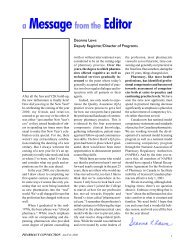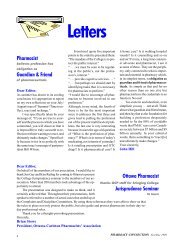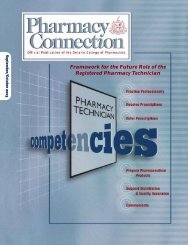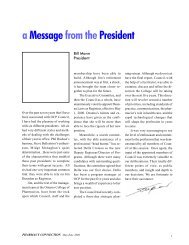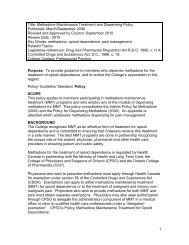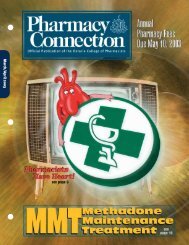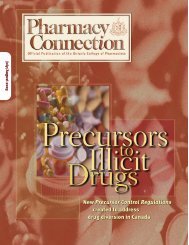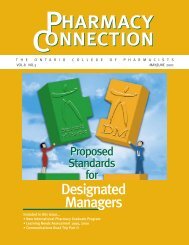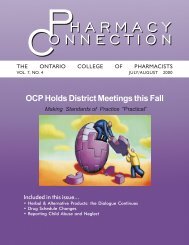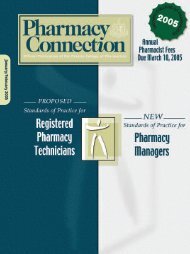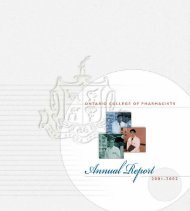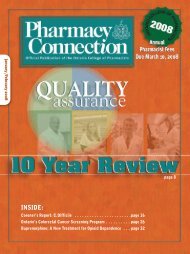September/October 2004 - Ontario College of Pharmacists
September/October 2004 - Ontario College of Pharmacists
September/October 2004 - Ontario College of Pharmacists
Create successful ePaper yourself
Turn your PDF publications into a flip-book with our unique Google optimized e-Paper software.
14th Annual Report <strong>of</strong> the Geriatric and Long Term Care Review Committee, 2003<br />
Recommendations<br />
on Drug Use<br />
in the Elderly<br />
The following recommendations were taken from the Thirteenth Annual Report<br />
<strong>of</strong> the Geriatric and Long-Term Care Review Committee to the Chief Coroner<br />
for the Province <strong>of</strong> <strong>Ontario</strong>.<br />
During 2003, 17 cases were reviewed with eight cases giving rise to recommendations<br />
that should be reviewed by pharmacists in the categories <strong>of</strong> medical/nursing<br />
management, communication and documentation and drug use in the elderly.<br />
The recommendations are presented here (verbatim) for you to consider when<br />
caring for the elderly.<br />
Medical/Nursing Management<br />
1. Health care pr<strong>of</strong>essionals should be reminded that<br />
constipation and obstipation are common, preventable<br />
and treatable medical conditions that affect the<br />
elderly. Untreated, these conditions can be devastating<br />
and may even result in death. Once obstipation<br />
is suspected, aggressive investigation and treatment<br />
should be considered on a case by case basis.<br />
As with many geriatric syndromes, obstipation may<br />
present either typically (abdominal pain, fecal incontinence)<br />
or atypically (confusion, delirium). Health<br />
care pr<strong>of</strong>essionals should be especially wary <strong>of</strong><br />
elderly patients who present with constipation/obstipation<br />
who have associated systemic symptoms<br />
(tachycardia).<br />
In these cases, the ordering <strong>of</strong> laboratory investigations<br />
and an EKG should be considered on a case<br />
by case basis. Elderly patients receiving medications<br />
known to decrease bowel motility such as<br />
narcotics or other proconstipatory drugs such as<br />
calcium channel blockers should be put on a<br />
prophylactic bowel regimen. The bowel regimen<br />
should include the addition <strong>of</strong> fibre to their diet,<br />
the provision <strong>of</strong> stool s<strong>of</strong>teners, and prn laxatives<br />
such as Milk <strong>of</strong> Magnesia or Lactulose every night<br />
that there isn’t a bowel movement. If there is no<br />
bowel movement for three days, consideration<br />
should be given to the administration <strong>of</strong> an enema.<br />
In addition, health care pr<strong>of</strong>essionals should be<br />
aware that initiating treatment with natural fibre<br />
and/or bulk forming laxatives in the presence <strong>of</strong><br />
obstipation/fecal impaction can potentially worsen<br />
the situation especially if the patient’s fluid intake is<br />
inadequate and/or mobility is impaired.<br />
Health care pr<strong>of</strong>essionals should also be reminded<br />
that, in the perioperative period, the presence <strong>of</strong><br />
bowel movements does not always eliminate the<br />
possibility that obstipation/fecal impaction is<br />
present and/or developing. The development <strong>of</strong><br />
postoperative abdominal pain in the elderly should<br />
alert the treating health pr<strong>of</strong>essionals to the<br />
possibility that obstipation/fecal impaction is<br />
present.<br />
The occurrence <strong>of</strong> overflow incontinence<br />
should alert the treating health care pr<strong>of</strong>essionals<br />
to the possibility that the patient has<br />
developed fecal impaction with overflow incontinence.<br />
Fecal impaction can be difficult to treat and<br />
should be treated vigorously when present. Careful<br />
abdominal and rectal examinations should be<br />
preformed. The finding <strong>of</strong> s<strong>of</strong>t stool or no stool in the<br />
rectum does not absolutely rule out the presence <strong>of</strong><br />
fecal impaction.<br />
In these cases, an abdominal flat plate x-ray should<br />
be ordered to rule out the possibility <strong>of</strong> a higher<br />
impaction that cannot be detected on rectal examination<br />
and/or a developing acute/sub acute bowel<br />
obstruction (dilated loops <strong>of</strong> bowel with air/fluid<br />
levels). While manual disimpaction should be the<br />
first intervention attempted, the presence <strong>of</strong> obstipation<br />
with a higher impaction should be primarily<br />
be managed with enemas to clear the bowel from<br />
below. In some cases, the addition <strong>of</strong> oral osmotic<br />
laxatives such as Lactulose can be used to clear the<br />
bowel from above. Gastrointestinal lavage solutions<br />
have also been proven to be very effective in treating<br />
fecal impaction.<br />
Reference: Constipation can be Deadly – Canadian<br />
Family Physician, Volume 38, <strong>October</strong> 1992;<br />
Goldlist B., Nagalie G., Gordon M.<br />
Comment: This recommendation was made in two<br />
reviews in 2003.<br />
2. Health care pr<strong>of</strong>essionals should be reminded that<br />
the presence <strong>of</strong> a persistent fever following the institution<br />
<strong>of</strong> antibiotic therapy may be indicative <strong>of</strong> the<br />
presence <strong>of</strong> an unrecognized medical condition.<br />
3. Health care pr<strong>of</strong>essionals should be reminded that<br />
treatment with oral antibiotics is a reasonable first<br />
line <strong>of</strong> defence in the management <strong>of</strong> elderly patients<br />
with a suspected infectious process. The development<br />
<strong>of</strong> systemic symptoms such as nausea,<br />
vomiting, decreased bowel function, and abdominal<br />
It is evident from the recommendations that this<br />
committee sees pharmacists as an integral part <strong>of</strong> the<br />
health care team in providing optimal services to<br />
geriatric and long-term care patients.<br />
pain should result in consideration being given to<br />
changing the route <strong>of</strong> antibiotic administration from<br />
oral to parenteral.<br />
4. Health care pr<strong>of</strong>essionals caring for the elderly in the<br />
long-term care setting should be knowledgeable<br />
about the causes, complications, and management <strong>of</strong><br />
urinary incontinence and retention. Long-term care<br />
facilities should develop policies and procedures to<br />
assist health care pr<strong>of</strong>essionals in the management <strong>of</strong><br />
these conditions.<br />
5. Health care pr<strong>of</strong>essionals should be reminded that,<br />
although decubitus ulcers are commonly seen in the<br />
immobilized, ill elderly, they are never a normal<br />
consequence <strong>of</strong> disability and immobility. The potential<br />
for the development <strong>of</strong> serious infection,<br />
septicemia, and death must always be remembered.<br />
6. All health care institutions in the Province <strong>of</strong> <strong>Ontario</strong><br />
should develop a policy and procedure to ensure that<br />
resuscitation carts contain all necessary equipment<br />
to conduct resuscitation.<br />
38<br />
Pharmacy Connection <strong>September</strong> • <strong>October</strong> <strong>2004</strong><br />
Pharmacy Connection <strong>September</strong> • <strong>October</strong> <strong>2004</strong> 39



